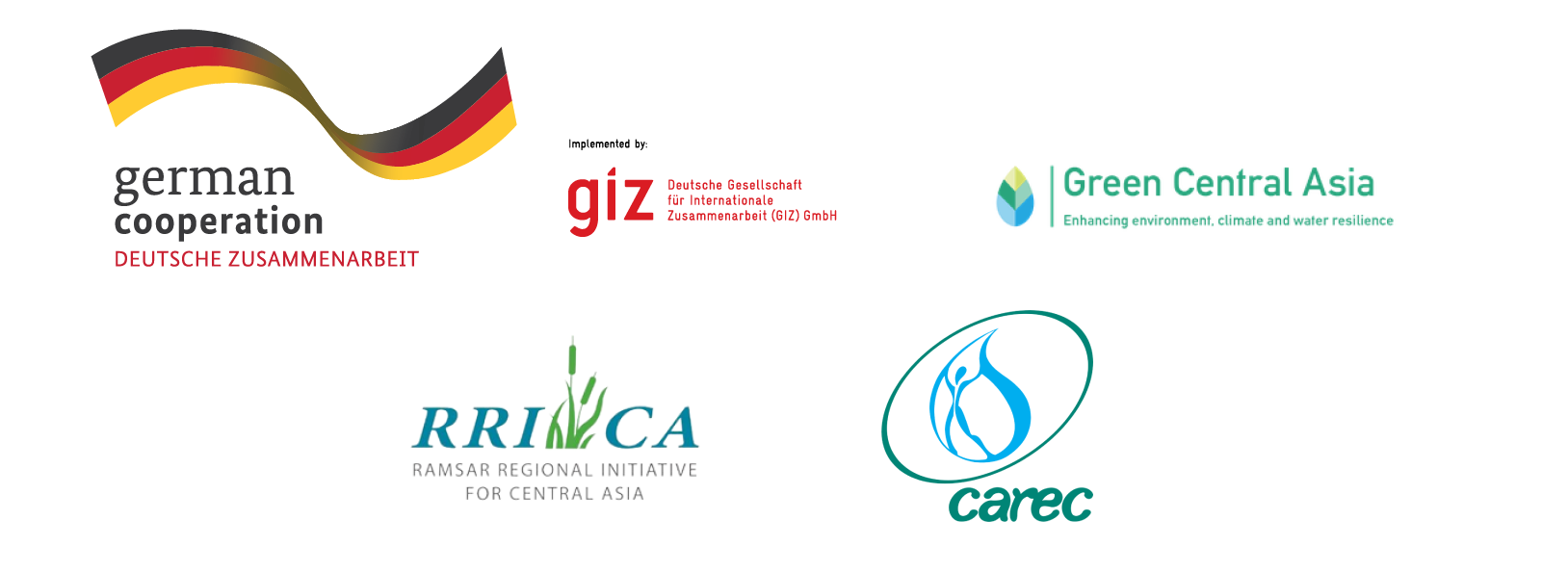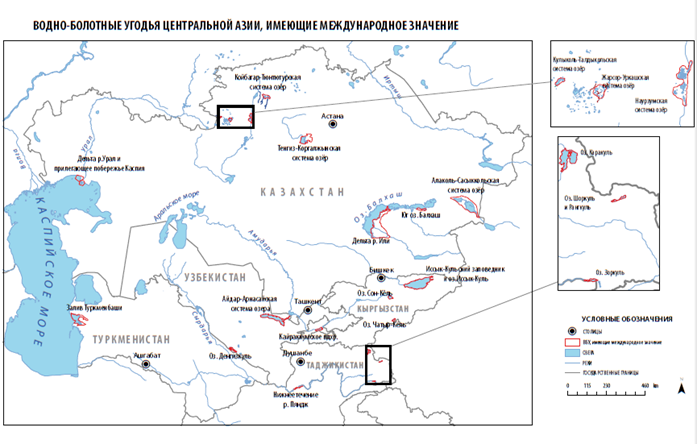News

Wetlands are considered to be the most productive ecosystems on the planet and centers of biological diversity and primary productivity. The existence of countless different unique species of plants, birds, fish, amphibians and mammals depends on wetlands.
Despite the numerous natural functions of wetland ecosystems and their significance for humans and the environment, scientific estimates show that 64% of the world’s wetlands have disappeared since 1900. In some regions, notably Asia, the loss is even higher. This is due to the fact that for a long-time wetland were perceived as unnecessary wastelands and therefore were drained, filled in, burnt off and re-purposed.
The Convention on Wetlands, more commonly known as the Ramsar Convention, is an international agreement, which provides the basis for national action and international cooperation for the conservation and wise use of wetlands and their resources.
The treaty, adopted in the Iranian city of Ramsar in 1971, is the aspiration of the Parties to work towards the wise use of all their wetlands, to designate suitable wetlands for the list of Wetlands of International Importance (the “Ramsar List”) and ensure their effective management and to cooperate internationally on transboundary wetlands, shared wetland systems and shared species.
For more information please visit the Ramsar Convention website www.ramsar.org
Wetlands in Central Asia
The Central Asian region has a wide variety of wetlands - rivers, lakes, reservoirs, ponds, marshlands and other types that play an important role in preserving globally significant biodiversity.
There are serious threats of anthropogenic nature in the region, which lead to deterioration of the quality of the environment of wetlands and degradation of their ecosystems: man-made pollution, unregulated water abstraction for agricultural needs, uncontrolled use of bioresources, change of natural drains and construction of dams, as well as cross-border issues of rational use of water resources.
Currently 23 wetlands in the region have received the status of wetlands of international importance (Ramsar Sites).

Ramsar regional initiative for Central Asia (RRI-CA)
Kazakhstan, Kyrgyzstan, Tajikistan, Turkmenistan and Uzbekistan are Contracting Parties to the Ramsar Convention. In November 2015, three of the contracting parties (Kazakhstan, Kyrgyzstan and Turkmenistan) agreed with the official proposal for the establishment of the Ramsar Regional Initiative of Central Asia. Tajikistan and Uzbekistan have expressed their willingness to be involved in the work of the initiative and the possibility of their further formal accession.
The main decision-making body of the RRI-CA is a Coordination Committee. The Chair of the RRI-CA Coordination Committee is Maxim Mitropolsky.
RRI-CA aims to promote stronger cooperation and synergies between the members to the RRI-CA to effectively implement the Ramsar Convention and its Strategic Plan 2016-2024 at the national and regional levels.
Operational targets of the RRI-CA include:
a. Coordination and communication:
-
· Support the implementation of the Ramsar Strategic Plan 2016-2024 in Central Asia;
-
Carry out scientific and technical monitoring of the implementation of the Ramsar Strategic Plan 2016-2024 in Central Asia;
-
Facilitate feedback and information flow between the members as well as between the members and the Ramsar Secretariat;
-
Ensure synergy and coordination of the implementation of the Ramsar Convention in Central Asia with other regional and international mechanisms related to water resources, biodiversity, and sustainable development including multilateral environmental agreements;
-
Create and maintain a platform for the regular and effective sharing of information related to the implementation of the Ramsar Convention in Central Asia;
-
Engage in regional dialogues to promote the conservation and wise use of wetlands.
b. Designation and management of Ramsar Sites, and the conservation of other important wetlands:
-
Promote the effective conservation and wise use of existing and future Ramsar Sites in the region;
-
Make inventories of important wetlands in the region and to establish a regional wetland database;
-
Develop and apply common monitoring mechanisms for evaluating the status of existing and future Ramsar Sites;
-
Develop and apply a common methodology for evaluating ecosystem services generated by wetlands, and assessing their economic values.
c. Communication, education, participation and awareness (CEPA), and capacity building:
-
Identify technical capacity building needs in the region and provide trainings and workshops as required;
-
Raise awareness and knowledge of the general public on the importance of wetland ecosystems and the steps needed for their conservation and wise use;
-
Raise awareness of decision makers at all levels on the importance of wetland ecosystems and ensure that wetland issues are included in national and regional dialogues on environment;
-
Promote continuous transfer of knowledge and experience sharing within Central Asia and with other regions of the world.
d. Project development and management:
-
Initiate and raise funds for projects and programmes in the area of the conservation and wise use of wetlands in Central Asia;
-
Provide support in the management of projects and programmes.
The RRI-CA is proposing to develop and implement regional projects along the following priorities in the next triennium (2016-2018).
First priority area: Important wetlands of the region, including the future Ramsar Sites, are identified and documented (contribute to the targets 8, 11, 12 and 15 of the Ramsar Strategic Plan 2016-2024). The activities include:
-
Identify, conduct inventories, and map the important wetlands in the region;
-
Evaluate the current status of the wetlands, the ecosystem services they provide, threats, and opportunities for improved conservation and wise use;
-
Set up and maintain a regional inventory of the important wetlands.
Second priority area: Important wetlands of the region, including the existing and future Ramsar Sites are effectively managed so they are conserved and wisely used and continue to contribute to the improved quality of the life of people in the region (contribute to the targets 5, 11, 12, 13 and 15 of the Ramsar Strategic Plan 2016-2024). The activities include:
-
Evaluate the effectiveness of the management practices;
-
Develop and apply effective and sustainable management plans;
-
Carry out valuation of ecosystem services with focus on their contribution to sustainable livelihoods, disaster risk reduction and climate change adaptation;
-
Carry out restoration of the important wetlands as necessary;
-
Plan and implement projects focused on creating sustainable livelihoods, and building disaster and climate resilient communities.
Third priority area: Awareness and knowledge of the importance of wetlands are improved at all levels (contribute to the targets 15 and 16 of the Ramsar Strategic Plan 2016-2024). The activities include:
-
Develop and implement regional and national plans of CEPA (communication, education, participation and awareness);
-
Develop and implement awareness-raising programmes for local communities on the conservation and wise use of wetlands;
-
Document and demonstrate services and benefits of wetlands to the general public;
-
Deliver training to decision makers at all levels;
-
Set up wetland information and education centers
RRI-CA aims to promote stronger cooperation and synergies between the Parties to effectively implement the Ramsar Convention and its Strategic Plan 2016-2024 at the national and regional levels. You can get familiar with the Strategic Plan 2016 – 2024 here.
The Initiative will:
· Allow the members of the RRI-CA to effectively present themselves as one region in regional and international dialogues on the conservation of environment and wetlands;
· Strengthen synergies in joint activities of the members of the RRI-CA with other national, regional and international bodies that work on the conservation of environment and wetlands;
· Serve as a bridge and intermediary between the members of the RRI-CA as well as between the members and the Ramsar Secretariat.
-
The 50th Anniversary of the Ramsar Convention - 2 February 2021_info_2021_Kazakhstan
-
Information on hold.events_World Wetlands Day_50years_convention_Kyrgyzstan
-
Update of the information on the status of wetlands in Kazakhstan, Kyrgyzstan, and
-
The Economics of ecosystems and biodiversity for water and wetlands, 2013
-
Blank offline Ramsar information system word form, November 2015
Project manager: Ludmila Kiktenko
E-mail: lkiktenko@carececo.org
Project coordinator: Aizhan Kossantayeva
E-mail: empspecialist@carececo.org
Coordinating Committee:
Chairman: Maxim Mitropolsky, max_raptors@list.ru
Kazakhstan:
Rinat Esmagulov, r.esmagulov@ecogeo.gov.kz;
Sergey Sklyarenko, sergey.sklyarenko@acbk.kz;
Adylbek Kozybakov, oomt.04@mail.ru;
Tatyana Bragina, tm_bragina@mail.ru;
Ruslan Urazaliev, uruslankamenka@inbox.ru;
Alexey Timoshenko, naur_timoshenko@mail.ru;
Ivan Zuban, zuban_ia@mail.ru;
Rishat Batryakov, batryakov_naurzum@mail.ru.
Kyrgyzstan:
Talantbek Turdumatov, Turdumatov.fauna@mail.ru;
Askar Davletbakov, askar.davl@rambler.ru;
Bakytbek Choroev, karatal-zhapyryk@fauna.kg;
Irlan Syuyunbaev, issyk-kul-biosfera@fauna.kg;
Sergey Kulagin, kulagins1@mail.ru;
Anatoly Ostaschenko, aostas@yandex.com.
Tajikistan:
Khisrav Shirmatov, shermatov.khisrav@gmail.com;
Firuz Safarov, fsafarov666@gmail.com;
Sukhrob Irgashev, sirgashev@gmail.com;
Bekhruz Safarov, bekhruzsafarov99@gmail.com.
Turkmenistan:
Dzhumamurad Saparmuradovich, saparmuradov@mail.ru;
Eldar Rustamov, elldaru@mail.ru;
Shirin Baimukhamedovna, shirinkarryeva.sk@gmail.com;
Sakhetmyrat Mammadov, mammedowmerdan89@gmail.com;
Hojamyrad Hojamyradov, hojamurad@mail.ru.
Uzbekistan:
Maxim Mitropolsky, max_raptors@list.ru;
Jakhongir Talipov, jakhongirtalipov@gmail.com;
Luiza Mardonova, mardonova.luiza@mail.ru;
Kurbon Muratov, melior@minwater.uz;
Yakub Ametov, raf_78@inbox.ru;
Oleg Kashkarov, oleg.kashkarov1986@gmail.com;
Tutigul Kholmurodova, t_kholmurodova@mail.ru;
Roman Kashkarov, roman.kashkarov@iba.uz;
Abdukakhhor Gaffarov, +998 93 4753912 telegram;
Ishmamat Tagaev, jonlitabiat-2002@mail.ru;
Sherzod Ergashev, sherzodergashev9933@gmail.com.
